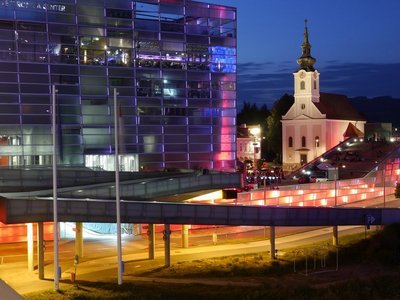

At the green campus of Johannes Kepler University Linz, around 170 researchers, citizen scientists, public relations and research service staff at science institutions, librarians and other interested parties listened to the welcoming words of the hosts as well as the Austrian Science Minister Martin Polaschek at 9:00 am. Austria would take numerous initiatives - from the citizen science funding program Sparkling Science 2.0 to the TruSD measures to "strengthen trust in science and democracy in Austria" to the development of STEM regions - to promote interest in science.
The program included workshops, lectures and poster presentations as well as two keynotes. On the first day, Margaret Gold, coordinator of the Citizen Science Lab at Leiden University, spoke about the development of policies and strategies for citizen science in the context of open science at global, European, national and local levels. In the closing keynote, Melanie Smallman, associate professor of science and technology studies at University College London, explored why it is important to involve citizens in the development of new technologies at different levels.
Among the many conference participants, the staff of the OeAD Center for Citizen Science was also represented with four contributions. On the first day, Claudia Fahrenwald, professor at the PH Upper Austria and Walburg Steurer presented results of a pilot project on the integration of Citizen Science in teacher training in the context of a seminar on school development. The second day focused on new target groups for citizen science. Anja Palandačić, head of the Sparkling Science 2.0 project "Biodiversity of the Austrian minnows" at the Natural History Museum Vienna, and Petra Siegele reflected on how population groups beyond school classes can be reached and what new opportunities and challenges this brings. The fact that families, for example, can be a new target group for citizen science - especially in order to reach the middle-aged segment - was taken up by Marika Cieslinski in the context of a Cabin Talk, in which the Citizen Science Award served as a practical example. In a joint workshop with colleagues from the DACH region, ideas for a cross-national mentoring program for citizen science projects were also collected and reflected upon.
Following the conference, citizen science projects presented themselves on the main square in Linz on April 21. At a total of 10 market stalls or kiosks, project leaders invited interested citizens to participate. For schoolchildren, there was a performance with translation into sign language and a treasure hunt at the Circus of Knowledge on the JKU campus.
It was again a beautiful and very exciting citizen science conference. Many thanks to the organisers of the JKU for a super planned conference!
Next year, the Austrian Citizen Science Conference will take place under one roof with the conference of the European Citizen Science Association in April in Vienna. We are already looking forward to it!